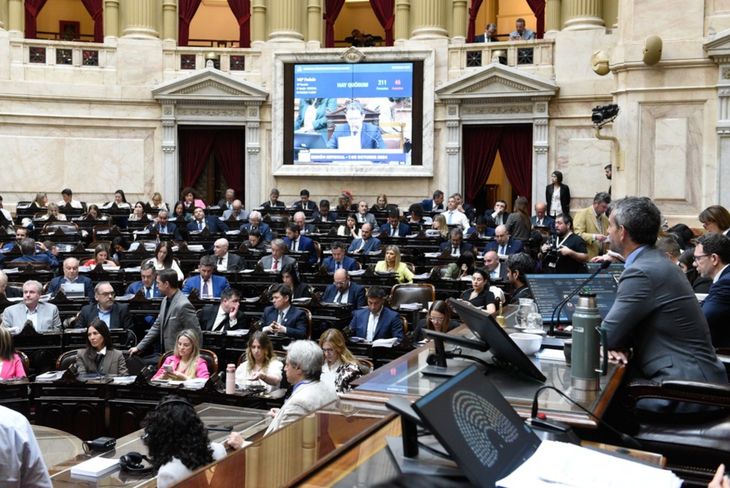The Government does not rule out calling extraordinary sessions in Congress. With the debates of Budget 2025 and the clean record project ahead, the presidential spokesperson Manuel Adorni He acknowledged that this measure is a variable that is being studied by the ruling party: “It is not defined but it is a possibility”he completed in his press conference at Casa Rodada.
In detail, the ordinary sessions of Congress take place from March 1 to November 30 of each year. Previously, in December 2023, Javier Milei’s government called extraordinary meetings to discuss its package of measures known as the “Base Law“.
The Government does not rule out calling extraordinary sessions
Javier Milei’s first year is coming to an end. However, the ruling party seeks to continue advancing its own projects and those of allies in Congress and, to that end, it does not rule out calling for extraordinary sessions so that Legislative Branch debate the proposals.
It should be noted that, according to the law, Congress meets every year of the March 1 – after the opening of ordinary sessions – to November 30. If the Executive Branch considers it necessary, it may request the Legislative Branch to call extraordinary sessions outside the normal dates of parliamentary debate. specifying what topics should be addressed.
Martín Menem Deputies Congress
During December 2023, Congress called extraordinary sessions to debate the basic law.
Deputies
In this case, two major projects are in sight: Budget 2025 and clean record. In the case of the Mother Law, the ruling party reiterated on numerous occasions that it is in no rush to discuss the text and, if necessary, will extend the 2023 budget again.
Regarding the project promoted by the PRO and other sectors related to the Government, it seeks to prevent people with criminal cases with final convictions from being able to run as candidates for elective positions. After the ratification of Cassation of the conviction of Cristina Fernández de Kirchner and with the horizon set on the 2025 legislative electionsthe legislative proposal takes on more relevance than ever.
Adorni today confirmed that the call for extraordinary measures is a “possibility” although he assured that it is not defined. A little over a week ago, the Chief of Staff, Guillermo Francos, also gave his opinion on this debate and stated that “It is not planned that extraordinary sessions will be called“and stressed that the ruling party has no “urgency for the Budget to be approved.”
In addition, the libertarian administration also seeks to advance with proposals to privatize Aerolíneas Argentinas and the one referred to right to self-defense and fulfillment of duty.
The opposition could also take advantage of the extraordinary sessions to push its own agenda. Namely, among the most relevant projects are the elimination of online betting advertising and the classification of gender violence in the workplace
Despite the tensions and tug-of-war, Congress could take advantage of these late sessions to advance what are believed to be projects with general consensus among legislators. Among them stand out; trial by jury; trial in absentia and the reform of the Penal Code against tax evasion.
The Government announced the withdrawal of Cristina’s presidential retirement and the pension for Néstor Kirchner
Another strong announcement given by Adorni in his press conference is that the Government will move forward in canceling the presidential retirement to former president Cristina Fernández de Kirchner and the pension by Néstor Kirchner. The confirmation of the elimination of the benefit came after confirming the six year sentence against the former president in the Roads case.
“Faced with the recent confirmation by the Criminal Cassation Chamber of the sentence of Cristina Fernández de Kirchner to six years in prison and special perpetual disqualification from holding public office, the government of President Milei, through the Ministry of Human Capitaldecided to cancel the privilege benefits that the former president had been receiving, both the personal allowance and the one derived from a pension,” Adorni explained.
Cristinakirchner.jpg

Cassation confirmed Cristina Kirchner’s 6-year sentence and disqualified her from running for public office.
According to the official, “the discharge arranged by resolution of the ANSES It does not constitute an accessory sanction to the criminal sentence that was imposed by the justice system, but rather a necessary consequence of the indignity implied by having been considered the author criminally responsible for the crime. crime of fraudulent administration to the detriment of public administration“.
The Government resolution details that “the benefit provided for by Law No. 24,018 For former presidents and former vice presidents of the Nation, it is an ex-gratia allocation, without a pension nature, that is granted as compensation for honor, merit and good performance of the position.” Based on this definition, the ruling party detailed that the retirement benefit It is not contributorythat is, it is not supported by equivalent contributions made by the beneficiary himself, but rather constitutes “a grace granted in recognition of merit and honor“.
“Even more so if the person who perceives it is condemned for defrauding millions of Argentines from the highest spheres of power. This is giving a little sense and sanity to public management,” Adorni stated at the conference.
“During the mandate of Javier Milei, Argentina will not allocate funds to any person who is convicted of corruption and who has tarnished the honor and dignity of Argentines,” concluded the presidential spokesperson.
Source: Ambito
I am an author and journalist who has worked in the entertainment industry for over a decade. I currently work as a news editor at a major news website, and my focus is on covering the latest trends in entertainment. I also write occasional pieces for other outlets, and have authored two books about the entertainment industry.




